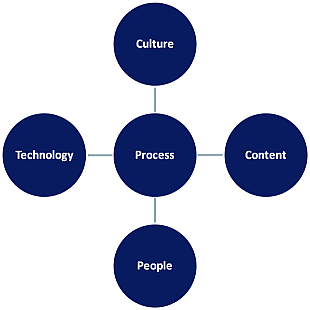On information management many definitions exist. Rominco favours the definition on Wikipedia. The definition on Wikipedia is: "Information Management" (IM) is the collection and management of information from one or more sources and the distribution of that information to one or more audiences”. Rominco likes this definition since it covers all types of information (from operational or transactional to managerial or decision making). The definition also hints that some kind of selection of audiences - and thus excluding others (confidentiality) – belongs to information management. The definition does not state that the collection and distribution needs to be reliable, efficient and effective. According to Rominco that is acceptable since the level of reliability, efficiency and effectiveness depends on your needs and ambitions.
Core components
It is good practice to define that IM has five core components. These five components are depicted in the graph below. In some views the Content component has its own hype or field of expertise. In those views it is commonly called “Enterprise content management”.
 |
According to Rominco Process is the basis. You design the processes in your organization as reliable, efficient and effective as you aspire them, taking into account the culture, technology and people of your organization. In some cases you are willing to compromise on the As is situation of one or more components. In other occasions you aspire to change the As is, leading to a change process that adapts one or more components. Argued from the Process the Content (or: data into and out of that process) is deduced from the Process, although in some views the Content is leading. Although not in the centre, the component People plays a major role. It is People that make the Culture, value the Content and will be the ones to define (and execute) the Processes. In the end all components play their role in the framework, making it that all components require your full attention as components of information management. |
Areas of expertise
Next to specific areas of expertise on the core IM component (like Knowledge management and good practices on Technology or Business Process Redesign on Process) very relevant areas of expertise exist. The most common areas of expertise are architecture, ICT governance (which is about responsibilities, ownership, quality control and organization of the ICT activities), sourcing and demand and supply management (including supplier management and service level management). As a result of the many years of broad experience, the thorough studies and the attentive attitude Rominco is aware of all relevant theories and good practices and has extensive experience in specifically data and application architecture, demand management and service level management. Rominco is ready and keen to deploy that knowledge and experience to your organization.
Earlier assignments
Some earlier assignments Rominco was allowed to execute:
- Make or buy decision on a logistics application for a manufacturer of wheelbarrows;
- Define application landscape;
- Define the decision model for evaluating the business value of applications;
- Execute supplier management;
- Define the (ITIL based) processes for 2 large ICT support organisations.

